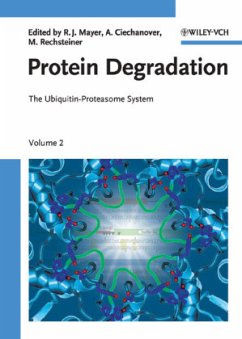The second volume in a new series dedicated to protein degradation, this book discusses the mechanism and cellular functions of targeted protein breakdown via the ubiquitin pathway.
Drawing on the combined knowledge of the world s leading protein degradation experts, this handy reference compiles information on the proteasome-mediated degradation steps of the ubiquitin pathway. In addition to proteasomal function and regulation, it also presents the latest results on novel members of the ubiquitin superfamily and their role in cellular regulation.
Further volumes in the series cover the function of ubiquitin-protein ligases, and the roles of the ubiquitin pathway in regulating key cellular processes, as well as its pathophysiological disease states.
Required reading for molecular biologists, cell biologists and physiologists with an interest in protein degradation.
Drawing on the combined knowledge of the world s leading protein degradation experts, this handy reference compiles information on the proteasome-mediated degradation steps of the ubiquitin pathway. In addition to proteasomal function and regulation, it also presents the latest results on novel members of the ubiquitin superfamily and their role in cellular regulation.
Further volumes in the series cover the function of ubiquitin-protein ligases, and the roles of the ubiquitin pathway in regulating key cellular processes, as well as its pathophysiological disease states.
Required reading for molecular biologists, cell biologists and physiologists with an interest in protein degradation.
"... a comprehensive chapter on the structure of large, self-compartmentalizing proteases ... gives an overview how complex these 'molecular machines' are that keep our cells clean. The individual chapters are followed by extensive references, and this will quarantee immediate guided access to the important literature. In summary, the book provides much more than anyone could assemble from Pubmed in a meaningful way to get informed appropriately." - Zellbiologie aktuell
"...dieses Buch steckt erneut voller brisanter Informationen über eines der zentralsten Themen des Zellgeschehens. Auch im zweiten Band werden wieder die alllerneusten Forschungsergebnisse präsentiert."
Laborjournal
"...liefert wie auch der erste Band höchst brisante Informationen zu einem der wichtigsten Themen des Zellgeschehens, wobei auch hier immer die aktuellsten Forschungsergebnisse präsentiert werden ... für jeden, der sich mit zellulären Regulationsprozessen beschäftigt, unbedingt zu empfehlen..."
Pharmazie in unserer Zeit
"Die Artikel sind kompakt und trotzdem tiefgreifend. Einen visuellen Zugang zum Verständnis bieten hochwertige, meistenteils farbige Bilder. Das Buch ist für jeden geeignet, der sich einen Up-to-date-Überblick über das gesamte Wissensfeld verschaffen oder sich schnell in ein bestimmtes Einzelthema einlesen will, sei er Student oder erfahrener Lebenswissenschaftler. Einen Einstieg zur Vertiefung bietet die sorgfältige Auswahl der Literatur am Ende jedes Kapitels."
Nachrichten aus der Chemie
Laborjournal
"...liefert wie auch der erste Band höchst brisante Informationen zu einem der wichtigsten Themen des Zellgeschehens, wobei auch hier immer die aktuellsten Forschungsergebnisse präsentiert werden ... für jeden, der sich mit zellulären Regulationsprozessen beschäftigt, unbedingt zu empfehlen..."
Pharmazie in unserer Zeit
"Die Artikel sind kompakt und trotzdem tiefgreifend. Einen visuellen Zugang zum Verständnis bieten hochwertige, meistenteils farbige Bilder. Das Buch ist für jeden geeignet, der sich einen Up-to-date-Überblick über das gesamte Wissensfeld verschaffen oder sich schnell in ein bestimmtes Einzelthema einlesen will, sei er Student oder erfahrener Lebenswissenschaftler. Einen Einstieg zur Vertiefung bietet die sorgfältige Auswahl der Literatur am Ende jedes Kapitels."
Nachrichten aus der Chemie

